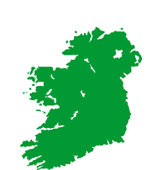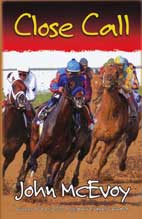
John McEvoy, 1936 - 2019
John McEvoy, the former editor of the Daily Racing Form, poet, and horse racing mystery author died Monday, June 10, 2019 in Evanston Hospital. He was 83.
McEvoy covered Chicago's thoroughbred racing industry for years, with great love for the sport and the characters who populate it, before taking over as editor of the Midwest edition in 1979 just as the publication was converting from "hot type" to "cold type."
He remained editor until the 100-year-old tradition of a Chicago-produced "Racing Form" ended in late 1994, when new owner Prime Media decided to shift operations to Phoenix. McEvoy refused to leave Chicagoland, and was reassigned as senior correspondent, during which time he profiled many local racing standouts such as trainers Jack Van Berg, Ernie Poulos and Jumbo Gural, jockeys Early Fires and Randy Romero, racing leaders Tommy Trotter and Dick Duchossois.
McEvoy later begin his second career as author first of the Eclipse Press' Legends series, in which he profiled the iconic racehorse Roundtable, followed by seven books including his Jack Doyle series of horse racing mysteries published by Poisoned Pen Press.
McEvoy loved the beauty of the equine athletes, his all-time favorite competitor being Graustark and later "the grey bullet of Chicago," the sprinting filly Meafara. He took delight during the Form's Kentucky Derby editions, in sneaking into print short, mischievous mentions of some of his longtime childhood friends, such as Frier McCollister, in made up escapades only they could recognize.
While a serious published poet, McEvoy was also a wicked serial poet of rhymes, including the Horse Player's Prayer, which begins "Dear God, and you, too, Moses/don't let me get beat so many noses." It was an compulsion; after beating esophageal cancer in 2007 he wrote "Poem for Radiology Ladies." He was a lover of jazz and in 1954 tells of using a fake ID to get into the Bee-Hive, on 55th St., for the first Chicago appearance of the Modern Jazz Quartet. He also enjoyed recounting the time he bought Sarah Vaughn a drink when she performed in Chicago at Mr. Kelly's in 1957.
For a decade, McEvoy continued his editing work on a gentler scale in his semi-retirement when he volunteered to tutor second graders in reading at Washington Elementary School in Evanston. One of his favorite encounters came when a young boy asked him how old he was. "Seventy-five," replied McEvoy. The boy looked at him wide-eyed with amazement. "Are you dead yet?" he asked, to McEvoy's amusement.
McEvoy was born in 1936 in Kenosha, Wisconsin. He is survived by his wife of 59 years, Judy of Evanston, their three children, Michael of Oakland, CA, Sarah of Urbana, IL, and Julia of Richmond, CA; 10 grandchildren, and his sisters Bernadette (Tuz) Healy, and Mary McEvoy of Dublin, Ireland and nieces and nephews.
A funeral mass will be held at St. Mary's Church, 1012 Lake St., Evanston, IL at 10 am. The family asks that donations be made in John's name to either of the following organizations: Curts Café which empowers at risk youth to become productive, self-sustaining members of the Evanston community or Precious Blood Ministry of Reconciliation which ministers to the incarcerated.
- 30 -
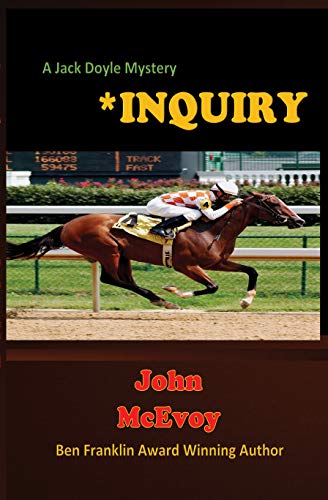
A Jack Doyle Mystery
Controversial decisions by U. S. thoroughbred track owners lead to murders that Jack Doyle must stop in the seventh novel in John McEvoy's horse racing mystery series. Doyle, ever the intrepid and irreverent amateur sleuth, also works to save his old friend Ralph Tenuta from a blackmail scheme hatched by a viciously clever horsewoman from Louisiana's Cajun country as well as attempting to extract furrier-to-the-Mob Moe Kellman's son-in-law from the grips of a persistent tout.
" McEvoy deftly manages his busy plot while liberally spicing it with intriguing racing stories."
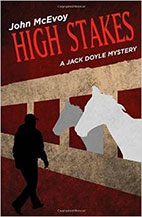
A Jack Doyle Mystery
Irreverent Jack Doyle has worn many hats, one or two blown off by his irrepressible temper. A former boxer, advertising rep, and publicity man, Jack's midlife career has been shaped by the world of thoroughbred horse racing and dark deeds therein. So it's no surprise when two FBI agents he's sleuthed with before pressure him to identify an animal activist who is carrying out "mercy killings" of retired race horses donated to Midwestern university veterinary schools. Plus two Chicago senior citizens are being threatened by an imperious Internet millionaire intent on owning their beloved horse.
Then a call comes from Ireland where the life of Jack's friend Niall Hanratty, the noted bookmaker, is under attack from an unknown enemy. Meanwhile Doyle's nemesis Harvey Rexroth, the rapacious media mogul Jack helped put into federal prison, enlists a fellow inmate, a Mob-connected attorney, to have Jack killed. Carrying out this contract will be W. D. Wiems, a brilliant, frighteningly warped University of Kansas student who has eagerly launched a career of murder for hire.
Fast tracking, Jack visits vet schools while juggling pieces of investigations near home and traveling twice to Ireland where his quest to find Hanratty's enemy takes him to Kinsale, Connemara, and a Dublin slum. Meanwhile the vicious contract killer is, all unknown, tracking Jack…
" McEvoy deftly manages his busy plot while liberally spicing it with intriguing racing stories."
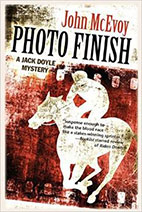
A Jack Doyle Mystery
Jack Doyle undertakes a new job in the world of thoroughbred horse racing as a jockey's agent. His client is a seventeen-year-old female riding phenoim. They prove to be an effective team until misadventure occurs as the result of someone secretly administering dangerously illegal medications to horses.
In his quest to identify the culprit, Doyle is aided by his old friend Moe Kellman; tainer Ralph Tenuta, himself the target of a blackmailer; and young veterinarian Ingrid McGuire.
"the author... writes convincingly about the turf... [in this] solid fifth Jack Doyle mystery."
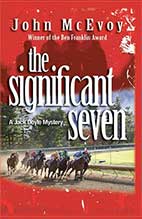
A Jack Doyle Mystery
In 2002, seven guys, friends from their days at the University of Wisconsin, Madison, are getting together for a few flutters on the horses. On this magical day they hit the Pick Six. It's a lot of money. And their leader, Arnie Rison, gets them to agree to use some of their seven-figure payoff to buy race horses.
Here they get lucky again: one of their buys turns out to be a stallion with sensational speed. A money-maker. When injury sidelines The Badger Express in 2005, he is worth a fortune more at stud fees. So Arnie instigates an agreement: if one of the Significant Seven dies, the others assume his share down to the last survivor.
It's now 2009. Some dastard is fixing races. Enter Jack Doyle and his old nemeses from the FBI. But when members of the significant seven begin to drop like flies, Doyle finds himself protecting Renee Rison, Arnie's daughter.
Will the always irreverent, observant, opinionated, sometimes mistaken but always persistent Jack Doyle solve not one, but two, series of crimes?
McEvoy is a racing expert whose knowledge permeates the pages, and, like any good tout, he's full of amusing stories about horses, bettors, and trackmen."
Midwest Book Reviews says "Mystery fans, especially those who enjoy the Sport of Kings, will appreciate this entry and the series as John McEvoy enhances the whodunit with horse racing tales."
"…the great Gaels of Ireland
Are the men that God made mad,
For all their wars are merry,
And all their songs are sad."
So wrote G. K. Chesterton in his poem "Ballad of the White Horse."
Characterizing citizens of that small nation, Chesterton might well have added a stanza or three about their tremendous affection for horses. Which is where my connection to Ireland in my writing, particularly my horse racing thriller Close Call (Poisoned Pen Press 2008), comes into it... Read more...
A Jack Doyle Mystery
Ex-amateur boxer and failed advertising account executive Jack Doyle, hero of Blind Switch, returns to the world of thoroughbred horse racing at a suburban Chicago track.
With the help of furrier-to-the-mob Moe Kellman, Doyle is hired as publicity director at Monee Park—a struggling racetrack owned by heiress Celia McCann. Celia, whose husband is afflicted with Lou Gehrig's disease, is fighting to keep the business afloat while awaiting passage of a law allowing the introduction of lucrative video slot machines. She's determined to maintain the business inherited from her beloved uncle Jim Joyce.
However, she is under pressure from her co-heir and cousin, Niall Hanratty, to close the track and sell the property to real estate developers. Niall will stop at nothing to convince Celia to sell, even hiring thugs from Chicago's Canaryville neighborhood to help persuade her.
Can the exploits of star sprinter Rambling Rosie save the track? Or will Doyle hold the key?
Written from an insider's viewpoint, and featuring a robust cast of offbeat characters, Close Call provides entertaining insight into the unique world of American horse racing with a climax as exciting as a Derby photo finish.
"Doyle here," he said, guiding the Accord into the left lane so that it wasn't completely surrounded by air-braking trucks and impatient grain traders and stock brokers trying to gun their expensive autos closer to the Jackson Street exit.
"I'm calling to wish you well on the first day of your new job," said the familiar voice of Moe Kellman. Doyle smiled. "Don't jive me, Moe. You're calling to see if I'm punctually on my way to work."
"Jack, Jack, how little you respect my opinion of you. I just thought I'd give you a buzz on my way to the club."
Doyle pictured the diminutive, sixty-eight year old Kellman, with his Don King-like head of frizzed white hair, sitting in the back seat of his chauffeur-driven Lincoln Town Car, tying the laces of his New Balance cross trainers as he neared Fit City. Kellman, reputed to be Chicago's "furrier to the Mob," had a daily workout regimen from which he never varied. He and Doyle had first met three years earlier at Fit City, the popular downtown health club.
Doyle said, "All right, Moe. Thanks for the call. Dinner tomorrow? Sure. I know you've got my best interests in mind. Most of the time," he added, before quickly cutting the connection.
Doyle put the phone down and reached for the radio dial. He turned on 90.9 FM, his favorite local jazz station. Disc jockey Bruce Burnett was promising an upcoming set that would include offerings from John Coltrane, Sarah Vaughn, the Kelly Brand Sextet, and Nicholas Payton. That was fine with Doyle, and he began to relax, accepting the jerky rhythm of the rush hour drive as he passed underneath the Eisenhower Expressway.
Nicholas Payton kicked off the WDCB set with "Way Down Yonder in New Orleans." Hearing the bold, round sound of Payton's trumpet, Doyle recalled the memorable night nearly eighteen years earlier when he had wandered into a Crescent City jazz club in the middle of a rousing jam session involving local musicians. Tired from a day spent with representatives of one of his firm's major marketing accounts, Doyle had felt himself revive as the wave of vibrant music rolled through the brick-walled room. After forty-five minutes or so, in a break between songs, the session's leader motioned toward the rear of the large room. Doyle saw a fresh faced, stocky, African-American youngster spring to his feet, a trumpet in his hand. He was wearing a Hawaiian shir,t a gray cloth cap, and an eager look. The cap reminded Doyle of the one worn by one of Doyle's mother's favorite television characters, Jackie Gleason's the Poor Soul. The men that the youngster joined on the grandstand were all many years older and all wore suits and ties over glistening dress shirts.
Any suggested connection to Gleason's Poor Soul was soon washed away when the young man stepped to the microphone, waited respectfully for his signal from the leader, and proceeded to blow the paint off the ceiling. The crowd was stunned by this awesome display of talent, many of them getting to their feet, looks of amazement and delight on their faces. When the set concluded a half-hour later, Doyle said to his waitress, "Who was that?"
"They tell me his name is Payton. Nicholas, I think they said. He's just turned sixteen. He's sure got it, don't he?"
"Could it have been that many years ago?" Doyle muttered to himself. Having recently turned forty-two, he sometimes found it hard to believe that such vivid scenes in his life were nestled so far back in the paStreet Details of his two failed marriages were less clear in his mind, he thought, and a good thing, too.
A white panel truck with the red logo "Smithereens Pest Control" shifted over one lane, leaving Doyle behind a red Saturn. He could see a small woman at its wheel. The Saturn's bumper was completely covered with slogans. As traffic slowed again Doyle read, from left to right, Who Would Jesus Bomb?"\É Keep Your Theology Off My BiologyÉMy Kid Brother Sells His Term Papers to Your Honor Student. The last one made Doyle laugh out loud. Then he had to slam on his brakes as a hulking black SUV cut sharply in front of him. Doyle's Accord stopped about the width of a slice of prosciutto from the vehicular mastodon in front of it. Doyle could see the SUV's driver shaking his fist and pounding his horn. "What the hell is he honking at?" Doyle said. "Asshole. He's the one who cut over." The SUV's two bumper stickers were in sharp contrast to those on the red Saturn. One read, Put Christ Back Into Christmas, the other Abortion: Murder of the Innocent. The SUV driver kept banging on his horn for another block.
South of White Sox Park at Thirty-fifth Street, traffic again jammed up. Creeping along now, checking his dashboard clock, Doyle tapped the steering wheel impatiently. He hated being late for anything, much less a new job. A little rim of sweat began to invade the top of his forehead.
Nearing Fifty-seventh Street, the SUV stopped suddenly. Doyle was ready for it this time, but he heard the sound of metal on metal from in front of him. "He must have bumped the red car," Doyle said to himself. Almost immediately, Doyle saw the Saturn pull off onto the left shoulder. Its rear end looked as if it had been sledge hammered. The SUV followed the Saturn, horn blasting away again. Doyle swore aloud as he saw the SUV driver fling open his door. "Uh oh," Doyle said. He started his own hazard lights flashing and eased the Accord onto the shoulder back of the SUV. He didn't like the looks of this.
Doyle saw the driver of the SUV lumber down from his perch. He was a medium tall, overweight white man, about Doyle's age, wearing khaki wash pants, a white sweatshirt declaring him to be a Bob Jones U. Parent, and a look of rage. Even his spiky black buzz cut seemed to be atingle. He moved toward the red Saturn, out of which stepped a short, slim young woman. She had on a tan sweater, brown slacks, and a look of bafflement on her pale face. Before he'd gotten his door completely open, Doyle could hear the Fat Man berating her in a voice that carried over the now resumed Dan Ryan traffic flow.
"Bitch! Why'd you stop that little tin can right in front of me?" Fat Man bellowed. "Shouldn't be allowed on the road, the way you drive."
The young woman bristled, color returning to her face. She said, "If you knew how to handle that big, ugly gas guzzler you wouldn't have rammed into me. You were following too closely. What were you thinking?"
Doyle walked up to where the two were standing now, face to face, Fat Man's complexion having taken on a Heinz 57 hue. He looked like he was either going to slap or belly bump the young woman. Doyle stepped between them. Fat Man, startled, snarled, "Who the hell are you?"
At just under six feet, Doyle was taller than Fat Man, who looked like a one-time high school tackle who had extensively padded his frame with Krispy Kremes, Whoppers, and long necks in the ensuing years. His gut stretched the size XXX gray sweatshirt. His meaty hands were bunched into fists.
Doyle spoke loud enough to be heard over the whooshing sound of passing vehicles. "Listen up, Orca, never mind who I am. Just back off until you can get a sheriff's patrol over here to sort this out. You got a cell phone?"
It took Fat Man several seconds to process what Doyle had said. Then he lunged forward and threw a wild right hand that Doyle dodged easily, the Fat Man stumbling past him after his miss. "You don't want to be doing this," Doyle warned. "Now, just calm down and you two can get this straightened out." He glanced at the young woman just as Fat Man let go with another right cross. This one missed by only a couple of inches as Doyle pivoted and ducked. Doyle said, "Mister, you know where you are here? You're out of your goddam element." Fat Man swore loudly. He was starting to get a little bit out of breath already, but his rage propelled him forward again. Doyle sighed, looked resignedly at the young woman, and shrugged. "How did this nitwit get any of his progeny into a university?" he said to her, before turning back to face the onrushing Fat Man.
I don't want to break a knuckle on that bowling ball head, Doyle thought as he got up on the balls of his feet. Seeing Doyle with his fists up, jaw tucked into his left shoulder, shuffling toward him, Fat Man momentarily hesitated. Doyle threw a stiff jab that turned Fat Man's nose sideways, then paused for a second before letting go with a lazy right hand designed to draw attention. Fat Man lifted his hands to protect his face. Doyle stepped in close to Fat Man and quickly hammered three left hooks under the right rib cage, the preferred target area of Doyle's favorite fighter, Julio Cesar Chavez, the Mexican champion renowned for his punishing kidney punches. Doyle's fist dug wrist deep into the layers of flab. Fat Man let out a girlish scream as he fell onto his side.
There was the sound of a distant siren. Doyle said to the wide-eyed young woman, "He won't bother you. The cops are on their way. I'm out of here."
She looked almost as stunned as the fallen Fat Man. She backed away from Doyle. "Are you a boxer?"
Doyle smiled. "Was once," he said. "Until I ran out of people I could beat, and started running into a whole bunch that I couldn't."
She smiled slightly at that before saying, "Well, thanks a lot for keeping that creep away from me. It's your good turn, at least for today."
"Oh, I imagine it'll be for more than today," Doyle smiled. "I don't think they'd find much Ôdo gooder' in my DNA. It's just that I've never been able to put up with the kind of bully lying over there." Fat Man glowered back at Doyle, but remained sitting on the pavement.
Doyle waved without looking back at her as he turned and hurried to his car, got in, then zipped down the expressway, heading south, not wanting to be late for work.
The morning haze had lifted and the March sun was now a visible presence. Doyle felt pumped. He grinned at himself in the mirror, feeling good in the way he'd felt more than twenty years before, when he was still a factor in AAU boxing. The young woman he'd helped back there certainly wouldn't report him for coming to her aid, and he knew Fatso was too bleary from punches to spot Doyle's rapidly receding license plate. "Doyle to the rescue," he said in a mocking voice, not really understanding the surge of exhilaration he felt, but riding it anyway.
Booklist calls Close Call "...a tale of greed and corruption played out in a milieu that McEvoy, a longtime racetracker, understands as well as any writer in the genre. The author gets the details right, a rarity in racing fiction, while delivering all the suspense of a photo finish."
